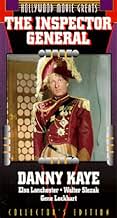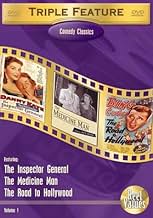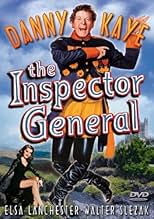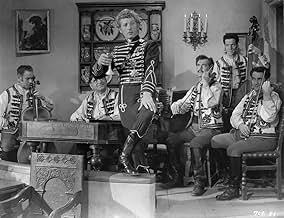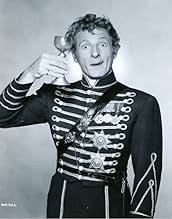PUNTUACIÓN EN IMDb
6,7/10
3,7 mil
TU PUNTUACIÓN
Añade un argumento en tu idiomaA town's corrupt officials think a fool is actually an investigator in disguise.A town's corrupt officials think a fool is actually an investigator in disguise.A town's corrupt officials think a fool is actually an investigator in disguise.
- Dirección
- Guión
- Reparto principal
- Premios
- 1 premio en total
Benny Baker
- Telecki
- (sin acreditar)
Oscar Blank
- Villager
- (sin acreditar)
George Boyce
- Party Guest
- (sin acreditar)
Chet Brandenburg
- Sentry
- (sin acreditar)
Leonard Bremen
- Lieutenant
- (sin acreditar)
Harriett Brest
- Villager
- (sin acreditar)
Albert Cavens
- Party Guest
- (sin acreditar)
Dick Cherney
- Sentry
- (sin acreditar)
Robert Cherry
- Peasant
- (sin acreditar)
Reseñas destacadas
Danny Kaye's films with Samuel Goldwyn established him as a leading movie comedian - singer from 1944 through the late 1940s. For a number of years after he continued his popularity without Goldwyn in films like "Knock on Wood", "The Court Jester" and "Merry Andrew". It is likely that "The Court Jester" is his best film, but "The Inspector General" is close to the top.
Based on a 19th Century satiric play by Nicolai Gogol, Kaye plays Georgi, a decent fellow who works for the bullying Yakov (Walter Slezak). Yakov and Georgi travel around the countryside selling "Yakov's elixir" which is supposed to cure all kinds of illnesses (that Kaye sings in a tongue-twisting song by Sylvia Fine, his wife). But they are forced to flee when Georgi tries to stop an elderly woman from wasting her money on the elixir. Naturally Yakov is upset, and sends Georgi away until he learns to be crooked. Yakov has been using a fake official document signed by Napoleon as a come on in his sales pitch. Georgi is carrying it. He is arrested by the town constable (Alan Hale Sr.) for vagrancy, but the latter reads the letter. As the Mayor (Gene Lockhart) and his cohorts are awaiting (with dread) a visit by Napoleon's Inspector General to check their records (they have been feathering their nests), they think that Georgi is this Inspector General. When Yakov comes to town he quickly grasps the situation, and pretends he is the "Inspector's" servant. Slezak knows that there are real opportunities here.
The funny thing is that Gogol's play is not quite like the film. First of all, Gogol was writing a critique of government corruption in the Russian Empire under Tsar Nicholas I (1825-1855). Gogol was a religious mystic and satirist (best recalled for his unfinished novel about serfdom, "Dead Souls", and his novellas "The Diary of a Madman" and "The Overcoat"). Normally Nicholas was a humorless despot, who hated intellectuals. But he liked THE INSPECTOR GENERAL, which attacked the worst aspects of Russian local government corruptions that the Tsar did want to see eradicated. Because he approved, the play was a great success, and became one of the few 19th Century plays that became part of the permanent world repertory.
But Gogol's targets were Russian, not French. Napoleon is not a background figure in the play. The Inspector General (actually the title is "The Government Inspector" in Russian) is from the Tsar. They have heard rumors of the corrupt practices, and are checking them. Georgi's character is not such a well-intentioned type in the play as he is in the movie. He is as willing to feather his nest as Yakob is, and they prove to be a highly successful team.
This is because the Mayor and his cohorts are quite willing to bribe their way out of the current investigation. This includes selling the Mayor's wife for sex, and paying out much in bribes and "gifts". And in the end, after "Georgi" and Yakob leave with their loot, the Mayor thinks he will be called to St. Petersburg for some really important post. But months later they hear of a letter circulating in the capital from "Georgi" boasting of how he fooled the Mayor and his cohorts. Then, just as things couldn't get worse, a servant announces the arrival of "a Government Inspector" to review the books. Everyone freezes in terror as the curtain falls.
The film softens "Georgi's" character, leaving Yakov as the greedy one (although Slezak does redeem himself at the end). The Mayor and his cohorts (who do things like collecting for a church bell but pocketing the money themselves) do try to kill off the Inspector General - there is a funny sequence at a party where "Georgi" sings a song about "sing Gypsy, dance Gypsy", and keeps on just avoiding drinking his doctored drink during the song. Georgi's guardian angel protects him. He also meets Leza, a servant (Barbara Bates) and falls for her. He debates how to appear before her as a General - should he be elegant like an Englishman, arrogant like a Russian, or smart like a German. In some ways "Soliloquy for Three heads" may be the best of the numbers in the film.
Although watered down from Gogol's stunning comic play, enough entertainment value remains in the film to make it worthwhile viewing, and a highpoint in appreciating Kaye's movie career.
Based on a 19th Century satiric play by Nicolai Gogol, Kaye plays Georgi, a decent fellow who works for the bullying Yakov (Walter Slezak). Yakov and Georgi travel around the countryside selling "Yakov's elixir" which is supposed to cure all kinds of illnesses (that Kaye sings in a tongue-twisting song by Sylvia Fine, his wife). But they are forced to flee when Georgi tries to stop an elderly woman from wasting her money on the elixir. Naturally Yakov is upset, and sends Georgi away until he learns to be crooked. Yakov has been using a fake official document signed by Napoleon as a come on in his sales pitch. Georgi is carrying it. He is arrested by the town constable (Alan Hale Sr.) for vagrancy, but the latter reads the letter. As the Mayor (Gene Lockhart) and his cohorts are awaiting (with dread) a visit by Napoleon's Inspector General to check their records (they have been feathering their nests), they think that Georgi is this Inspector General. When Yakov comes to town he quickly grasps the situation, and pretends he is the "Inspector's" servant. Slezak knows that there are real opportunities here.
The funny thing is that Gogol's play is not quite like the film. First of all, Gogol was writing a critique of government corruption in the Russian Empire under Tsar Nicholas I (1825-1855). Gogol was a religious mystic and satirist (best recalled for his unfinished novel about serfdom, "Dead Souls", and his novellas "The Diary of a Madman" and "The Overcoat"). Normally Nicholas was a humorless despot, who hated intellectuals. But he liked THE INSPECTOR GENERAL, which attacked the worst aspects of Russian local government corruptions that the Tsar did want to see eradicated. Because he approved, the play was a great success, and became one of the few 19th Century plays that became part of the permanent world repertory.
But Gogol's targets were Russian, not French. Napoleon is not a background figure in the play. The Inspector General (actually the title is "The Government Inspector" in Russian) is from the Tsar. They have heard rumors of the corrupt practices, and are checking them. Georgi's character is not such a well-intentioned type in the play as he is in the movie. He is as willing to feather his nest as Yakob is, and they prove to be a highly successful team.
This is because the Mayor and his cohorts are quite willing to bribe their way out of the current investigation. This includes selling the Mayor's wife for sex, and paying out much in bribes and "gifts". And in the end, after "Georgi" and Yakob leave with their loot, the Mayor thinks he will be called to St. Petersburg for some really important post. But months later they hear of a letter circulating in the capital from "Georgi" boasting of how he fooled the Mayor and his cohorts. Then, just as things couldn't get worse, a servant announces the arrival of "a Government Inspector" to review the books. Everyone freezes in terror as the curtain falls.
The film softens "Georgi's" character, leaving Yakov as the greedy one (although Slezak does redeem himself at the end). The Mayor and his cohorts (who do things like collecting for a church bell but pocketing the money themselves) do try to kill off the Inspector General - there is a funny sequence at a party where "Georgi" sings a song about "sing Gypsy, dance Gypsy", and keeps on just avoiding drinking his doctored drink during the song. Georgi's guardian angel protects him. He also meets Leza, a servant (Barbara Bates) and falls for her. He debates how to appear before her as a General - should he be elegant like an Englishman, arrogant like a Russian, or smart like a German. In some ways "Soliloquy for Three heads" may be the best of the numbers in the film.
Although watered down from Gogol's stunning comic play, enough entertainment value remains in the film to make it worthwhile viewing, and a highpoint in appreciating Kaye's movie career.
Danny Kaye was a wonderful performer, he would sing, dance, tell jokes, turn his face into rubber and just generally come off as a quality humanitarian. The Inspector General showcases all of those talents.
Directed by Henry Koster, The Inspector General is loosely adapted from Nikolai Gogol's classic Russian story, and it finds Kaye as a stooge of Walter Slezak's iffy tonic peddler who is mistaken by iffy officials of a small Russian town for the much feared and respected Inspector General. Cue mistaken identity mayhem as the music numbers, gags, visual contortions and all round slapstick ensues. Also along for the ride are Elsa Lanchester, Alan Hale, Barbara Bates and Gene Lockhart.
It's more a safe and solid Kaye movie for the family to enjoy, rather than a high end classic like The Court Jester, but sometimes the high energy jinks of Kaye is all you need to lift the blues away. 7/10
Directed by Henry Koster, The Inspector General is loosely adapted from Nikolai Gogol's classic Russian story, and it finds Kaye as a stooge of Walter Slezak's iffy tonic peddler who is mistaken by iffy officials of a small Russian town for the much feared and respected Inspector General. Cue mistaken identity mayhem as the music numbers, gags, visual contortions and all round slapstick ensues. Also along for the ride are Elsa Lanchester, Alan Hale, Barbara Bates and Gene Lockhart.
It's more a safe and solid Kaye movie for the family to enjoy, rather than a high end classic like The Court Jester, but sometimes the high energy jinks of Kaye is all you need to lift the blues away. 7/10
Watching this was enjoyable. The movie started off somewhat slowly, and took its time picking up the pace. However, the pace quickly picked up speed when Danny Kaye came on screen. This is partly because his partner shows up at the same time. Walter Slezak does a fantastic job of contrasting Kaye throughout the movie, but more of that later.
Danny Kaye's performance here is not quite as seamless as many. He does not seem to have the same audacity he displays in later movies, such as The Secret Life of Walter Mitty and The Court Jester. It is also different in that, although it includes the usual confusion, plot twists, and multiplicity of plans going on at once, these elements are not executed as beautifully as in, for example, The Court Jester. Thus these scenes become comedic background, still enjoyable to watch, but not the masterpiece one may have become accustomed to. However, the movie was far from terrible. There were moments which, as I watched them, made me think, "That's so Danny Kaye." He has many of the same mannerisms and little twitches that make him so much fun to watch, along with an array of songs that would tie a normal tongue in knots. He looks quite dashing in his military uniform, and his character's innocence is just so much fun to see in Danny Kaye's brilliant blue eyes.
His character (Georgi) is also contrasted masterfully with Slezak's (Yakov), making this movie a success. Yakov is so mean to poor Georgi (as well as everyone else) that the viewer simply must fall in love with the poor boy. Kaye plays a young man, very nearly a boy, while Yakov is so jaded and immoral. It is Yakov's cruelty to Georgi that endears Kaye's character to the viewer.
To sum up, The Inspector General is a lighthearted movie involving superb writing, excellent juxtaposition, and a wonderful star and supporting villain.
Danny Kaye's performance here is not quite as seamless as many. He does not seem to have the same audacity he displays in later movies, such as The Secret Life of Walter Mitty and The Court Jester. It is also different in that, although it includes the usual confusion, plot twists, and multiplicity of plans going on at once, these elements are not executed as beautifully as in, for example, The Court Jester. Thus these scenes become comedic background, still enjoyable to watch, but not the masterpiece one may have become accustomed to. However, the movie was far from terrible. There were moments which, as I watched them, made me think, "That's so Danny Kaye." He has many of the same mannerisms and little twitches that make him so much fun to watch, along with an array of songs that would tie a normal tongue in knots. He looks quite dashing in his military uniform, and his character's innocence is just so much fun to see in Danny Kaye's brilliant blue eyes.
His character (Georgi) is also contrasted masterfully with Slezak's (Yakov), making this movie a success. Yakov is so mean to poor Georgi (as well as everyone else) that the viewer simply must fall in love with the poor boy. Kaye plays a young man, very nearly a boy, while Yakov is so jaded and immoral. It is Yakov's cruelty to Georgi that endears Kaye's character to the viewer.
To sum up, The Inspector General is a lighthearted movie involving superb writing, excellent juxtaposition, and a wonderful star and supporting villain.
Hysterical. Danny Kaye is a comedy genius.
The Gypsy song was the best part of the film. (Zummm-shtok-shtok-hahaha) This is worth a look for this scene alone. It was fun watching the crowd get into it. I'd guess that scene was mostly ad-libbed. He clearly was in control. I bought the DVD (public domain) just for that scene.
The supporting cast did a great job too. Slezak nearly stole all of his scenes and Hale Sr. was perfect in support. And the costume designer deserved at least a nomination for the Oscar.
You can't take this one seriously. But then Danny Kaye lived to entertain. And few did it better.
The Gypsy song was the best part of the film. (Zummm-shtok-shtok-hahaha) This is worth a look for this scene alone. It was fun watching the crowd get into it. I'd guess that scene was mostly ad-libbed. He clearly was in control. I bought the DVD (public domain) just for that scene.
The supporting cast did a great job too. Slezak nearly stole all of his scenes and Hale Sr. was perfect in support. And the costume designer deserved at least a nomination for the Oscar.
You can't take this one seriously. But then Danny Kaye lived to entertain. And few did it better.
Danny Kaye show with his particular talent as a great comedian about an issue of mistaken identities
Freely based on Nikolai Gogol's play , "The Inspector General" about a false Inspector who comes to examine a little corrupt town . It deals with an illiterate called Giorgi (Danny Kaye, able to tongue twist faster than anyone else) along with his boss (Walter Slezak) , both of whom are wandering and acting as medicine men into a provincial town wherein panic . Then Giorgi's detained for vagrancy charge but he's misidentified as a feared Inspector General who comes to check up on them and whom the corrupter town officers (the Mayor : Gene Lockhart married to Elsa Lanchaster and another officer played by Alan Hale) think is secretly moving in disguise . Later on , they make various bungled tryings to murder him . Meanwhile , Giorgi falls in love with a beautiful maid (Barbara Bates) who is serving to the Mayor.
The film is a Danny Kaye recital , he sings , dances , stooges , makes acrobatics , tongue twister and puts faces and grimaces . It's a pretty amusing farce suggested by a play by the Russian writer Gogol with the master comedy actor and it displays much choreography and musical numbers . Sylvia Fine , Kaye's wife , is the lyricist , composer , besides associate producer and dialogs writer , and responsible for many of the best known musical routines and songs for her husband . The best gags are developed on the Charles Chaplin imitations when Kaye is having lunch ; the events in the crowded room with several hosts that seem Marx brothers sketches ; in addition , the comic numbers in the military training headquarter . Support cast is frankly good , such as Elsa Lanchester , Barbara Bates , Gene Lockhart , Alan Hale , Néstor Paiva and Rhys Williams , among others . The motion picture was well directed by Henry Koster . Picture is a Kaye vehicle , and many consider his best comedy , he's an authentic comedian and real farceur . If you like Kaye's crazy interpretation , you will most definitely enjoy this one .
The film is a Danny Kaye recital , he sings , dances , stooges , makes acrobatics , tongue twister and puts faces and grimaces . It's a pretty amusing farce suggested by a play by the Russian writer Gogol with the master comedy actor and it displays much choreography and musical numbers . Sylvia Fine , Kaye's wife , is the lyricist , composer , besides associate producer and dialogs writer , and responsible for many of the best known musical routines and songs for her husband . The best gags are developed on the Charles Chaplin imitations when Kaye is having lunch ; the events in the crowded room with several hosts that seem Marx brothers sketches ; in addition , the comic numbers in the military training headquarter . Support cast is frankly good , such as Elsa Lanchester , Barbara Bates , Gene Lockhart , Alan Hale , Néstor Paiva and Rhys Williams , among others . The motion picture was well directed by Henry Koster . Picture is a Kaye vehicle , and many consider his best comedy , he's an authentic comedian and real farceur . If you like Kaye's crazy interpretation , you will most definitely enjoy this one .
¿Sabías que...?
- CuriosidadesNikolay Gogol's play, "The Inspector General" opened in St. Petersburg, Russia. in April 1836.
- PifiasWhen Yakov first reads the note from Leza we can see it says "They are trying to kill you. Don't go near the barn." Later, when the woodchopper reads it he says "Don't go near the barn. They are trying to kill you."
- ConexionesEdited into Your Afternoon Movie: Inspector General (2022)
- Banda sonoraThe Medicine Show
(1949) (uncredited)
(aka "Yakov's Elixir")
Music and Lyrics by Sylvia Fine
Played by Musicians at the Medicine Show
Sung by Danny Kaye
Variations played in the score
Selecciones populares
Inicia sesión para calificar y añadir a tu lista para recibir recomendaciones personalizadas
- How long is The Inspector General?Con tecnología de Alexa
Detalles
- Fecha de lanzamiento
- País de origen
- Idioma
- Títulos en diferentes países
- Inspector general
- Localizaciones del rodaje
- Empresa productora
- Ver más compañías en los créditos en IMDbPro
Taquilla
- Presupuesto
- 2.873.000 US$ (estimación)
- Duración1 hora 42 minutos
- Relación de aspecto
- 1.37 : 1
Contribuir a esta página
Sugerir un cambio o añadir el contenido que falta

Principal laguna de datos
By what name was El inspector general (1949) officially released in India in English?
Responde


